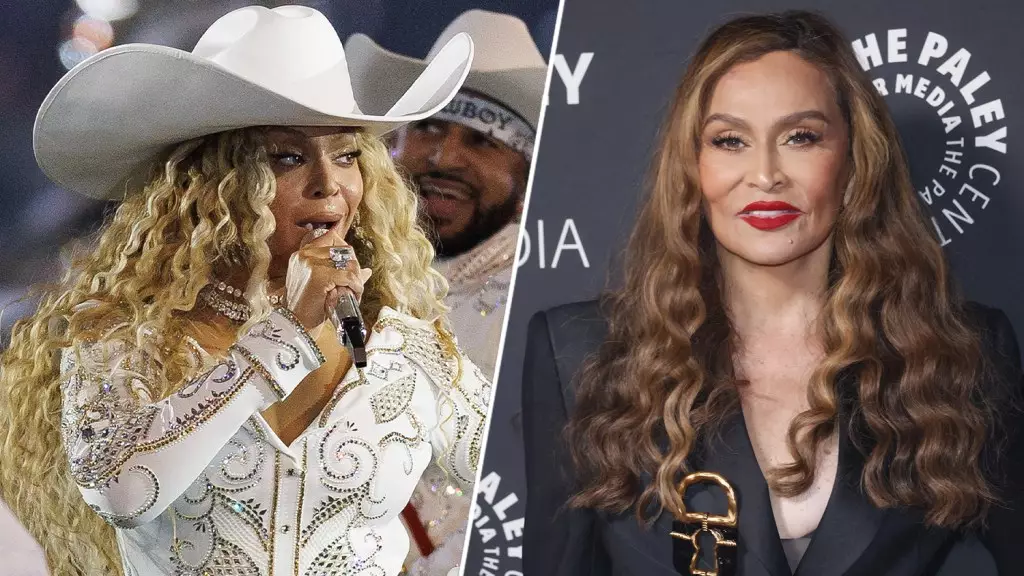Beyoncé, an artist venerable not only for her musical prowess but also for her unwavering public persona, recently demonstrated that her spotlight is bright enough to withstand the shadows of criticism. Despite her historical disinterest in engaging with detractors, the support from her mother, Tina Knowles, provides a poignant commentary on the dedication and passion that surrounds the icon. The backdrop for this public display of familial love unfolded during Beyoncé’s halftime show at the Houston Texans-Baltimore Ravens game, where her mother’s response to negativity encapsulated a broader societal issue.
Tina Knowles shared a social media post reflecting on the rampant negativity directed towards her daughter. The post, which resonated with fans, articulated a sentiment that speaks volumes about the juxtaposition between public admiration and criticism. Knowles expressed disbelief that individuals would spend their holiday watching a performance from an artist they claim to detest, highlighting a peculiar obsession underlying such behavior. This criticism often masks admiration and showcases a fundamental human tendency to critique what we cannot attain. Knowles’ commentary underscores the chaotic nature of celebrity culture, where the masses feel entitled to define and critique the worth of public figures.
This defiance against negativity is not a new theme in the world of celebrity. Over the years, Beyoncé has become a paragon of resilience, demonstrating time and again that immersion in her art transcends criticism. Knowles’ assertion, “No weapon formed against me shall prosper,” embodies the warrior spirit reflected in their family dynamic. This resilience acts as a reminder that criticism, while intrusive, can also serve as fuel for growth and self-affirmation.
The halftime performance itself was a historic affair. As the world tuned into the first-ever NFL game streamed on Netflix, Beyoncé captivated over 27 million viewers with her set, enriching her legacy and marking a momentous occasion in her musical journey. Performing tracks from her debut country album, “Cowboy Carter,” she fused genres, indicating her growth as an artist who refuses to be confined by traditional music labels. In an age where the industry often favors specialization, her willingness to experiment indicates a bold forward-thinking approach.
Joining her on stage were notable artists Shaboozey and Post Malone, alongside her daughter Blue Ivy Carter. The ensemble of talent not only showcased Beyoncé’s artistic versatility but also reflected her commitment to family — a recurring theme in her work. Her acknowledgment of Texas during the performance was not merely geographical; it was a tribute to her roots and the cultural tapestry of the state.
Despite the absence of her husband Jay-Z, who is presently embroiled in legal controversies, Beyoncé’s performance radiated positivity and celebration. The context of the performance, shadowed by serious allegations against Jay-Z, adds an additional layer of complexity to the narrative surrounding the concert. The unwavering support from the NFL, as articulated by Commissioner Roger Goodell, reinforces the complicated interplay between celebrity, accountability, and business interests in the entertainment industry.
Confronting Criticism with Grace
Beyoncé’s ability to steadfastly navigate the dualities of fame exemplifies the intricacies of modern celebrity culture. The ebb and flow of public perception can often feel like a rollercoaster, with massive peaks of adoration followed by swift valleys of criticism. However, Beyoncé’s approach — both in her career and personal ethos — suggests that confronting adversity with grace and resilience can forge a path through the noise.
Her mother’s social media post, wrapped in encouragement and ultimately signed “with love,” serves to uplift amidst the chaos. It provokes a deeper inquiry into why society feels so compelled to evaluate the lives of those in the public eye harshly. Knowles’ insights challenge the narrative of hatred, urging individuals to reconsider their engagement with artists — not just in terms of celebrity culture, but as human connectivity in an increasingly fragmented world.
The narrative surrounding Beyoncé’s recent performance intertwines familial support, artistic boldness, and the relentless scrutiny faced by public figures. The knowledge that she remains unmoved by negativity while simultaneously finding strength in her family creates a compelling portrait of resilience. It invites all observers to reflect on the nature of criticism while celebrating the joy her art brings to millions.

